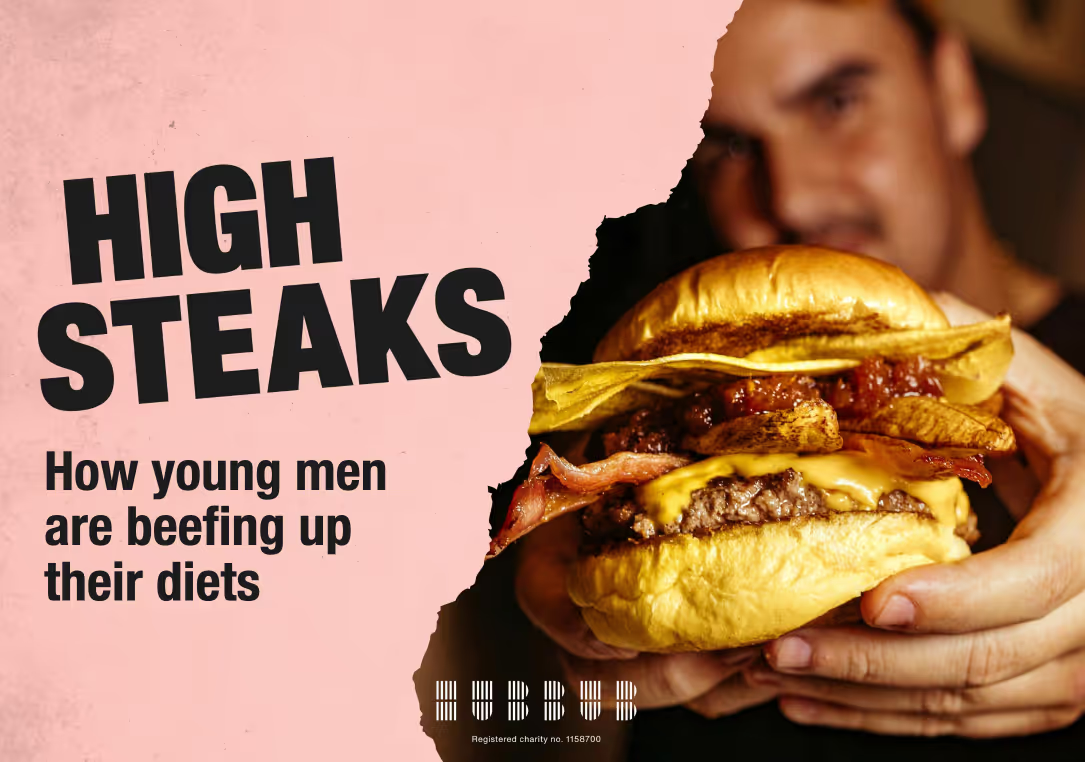
High steaks: why young men are eating more meat, and what it means for health, masculinity, and the planet





Coral Red: Mostly False
Orange: Misleading
Yellow: Mostly True
Green: True
Learn more about our fact-checking policies
The Protein Paradox: When Meat Meets Masculinity
While the UK has steadily reduced its meat consumption over the past two decades, a surprising demographic is bucking the trend: young men aged 16 to 24. According to Hubbub’s recent High Steaks report, this group is nearly three times more likely than the general population to have increased their meat intake in the past year. Over 40% eat meat daily, and a similar proportion express reluctance to cut back .
This divergence raises pressing questions: Why are young men consuming more meat amid growing awareness of its environmental and health impacts? And how can we address this trend without alienating those we aim to engage?

Meat and Masculinity: A Cultural Entanglement
The association between meat and masculinity is deeply ingrained. From barbecues to bodybuilding, meat has long symbolized strength, virility, and dominance. The High Steaks report highlights that men are 50% less likely than women to identify as vegetarian or plant-based. Younger men, in particular, often feel uncomfortable eating plant-based meals in social settings, fearing judgment or emasculation .
This discomfort isn't merely anecdotal. Social norms and peer perceptions play significant roles in dietary choices. The stereotype of the "soy boy"—a derogatory term used to belittle men who consume plant-based diets—exemplifies the stigma attached to plant-based eating among certain male groups .
The Manosphere's Influence: Online Echo Chambers
A significant factor amplifying meat consumption among young men is the "manosphere"—a network of online communities promoting traditional masculine ideals. Influential figures like Joe Rogan, Jordan Peterson, and Andrew Tate advocate for carnivorous diets, often touting unverified health benefits and downplaying environmental concerns. Their messages, disseminated through podcasts and social media, reach millions, reinforcing the notion that real men eat meat.
These narratives are not just about diet; they intertwine with broader themes of identity, resistance to perceived societal changes, and a reclamation of traditional male roles. The manosphere often positions plant-based diets as antithetical to masculinity, further entrenching dietary habits among its followers.

Protein Pressures and Misconceptions
The fitness industry's emphasis on protein intake has also contributed to increased meat consumption. Young men, striving for muscular physiques, often believe that high meat intake is essential for achieving their goals. However, nutritionists like Federica Amati note that many set unnecessarily high protein targets, leading to overconsumption of meat and potential health risks .
This protein obsession is fueled by marketing strategies that label various products—from milkshakes to snack bars—as "high-protein," reinforcing the idea that more protein equates to better health and fitness outcomes.
Health and Environmental Implications
The surge in meat consumption among young men has both health and environmental repercussions. Diets high in red and processed meats are linked to increased risks of colorectal cancer, heart disease, and other health issues. Environmentally, livestock farming is a significant contributor to greenhouse gas emissions, deforestation, and water pollution.
Despite these concerns, misinformation proliferates. Some influencers claim that meat consumption has negligible environmental impact, contradicting scientific consensus. This misinformation hampers efforts to promote sustainable dietary choices.
Reframing the Narrative: Strategies for Change
Addressing the rise in meat consumption among young men requires nuanced strategies that resonate with their values and identities:
- Align Plant-Based Eating with Masculine Ideals: Position plant-based diets as conducive to strength, endurance, and peak performance. Highlight athletes and fitness enthusiasts who thrive on plant-based nutrition.
- Leverage Trusted Influencers: Collaborate with male influencers who embody the desired traits and advocate for plant-forward diets. Their endorsement can challenge existing stereotypes and normalize alternative dietary choices.
- Promote Familiar and Appealing Plant-Based Options: Introduce plant-based meals that resemble traditional favorites, such as burgers or curries, making the transition less daunting.
- Focus on Personal Benefits: Emphasize immediate, tangible benefits like improved recovery times, enhanced energy levels, and cost savings, rather than solely environmental or ethical arguments.
- Create Supportive Environments: Encourage gyms, sports clubs, and educational institutions to offer and promote plant-based options, making them accessible and socially acceptable choices.
Conclusion: Towards Inclusive and Sustainable Eating Habits
The intersection of diet, identity, and misinformation presents a complex challenge. However, by understanding the underlying motivations and societal pressures influencing young men's dietary choices, we can craft messages and interventions that resonate. Promoting plant-based eating as a path to strength, health, and authenticity, not as a departure from masculinity, can pave the way for more inclusive and sustainable food systems.

Stand Against Nutrition Misinformation
Misinformation is a growing threat to our health and planet. At foodfacts.org, we're dedicated to exposing the truth behind misleading food narratives. But we can't do it without your support.
Sources & Further Reading
Hubbub (Original Report & Summary):
"High Steaks: How young men are beefing up their diets." Hubbub. Available at: https://hubbub.org.uk/young-men-and-meat
Issuu (Full PDF Report by Hubbub):
"High Steaks: How Young Men are Beefing Up Their Diets." Hubbub via Issuu. Available at: https://issuu.com/hubbubuk/docs/high_steaks_how_young_men_are_beefing_up_their_di
Green Queen (Analysis on Masculinity & Meat Consumption):
"Masculinity & Meat: How the 'Manosphere' Influences Young Men to Consume More Beef." Available at: https://www.greenqueen.com.hk/meat-masculinity-manosphere-young-men-beef-consumption
VegNews (Insights into Men’s Dietary Trends & Impact):
"Why Young Men Are Eating More Meat Despite Environmental and Health Implications." Available at: https://vegnews.com/men-meat-health-planet



foodfacts.org is an independent non-profit fact-checking platform dedicated to exposing misinformation in the food industry. We provide transparent, science-based insights on nutrition, health, and environmental impacts, empowering consumers to make informed choices for a healthier society and planet.

Was this article helpful?















.svg)
